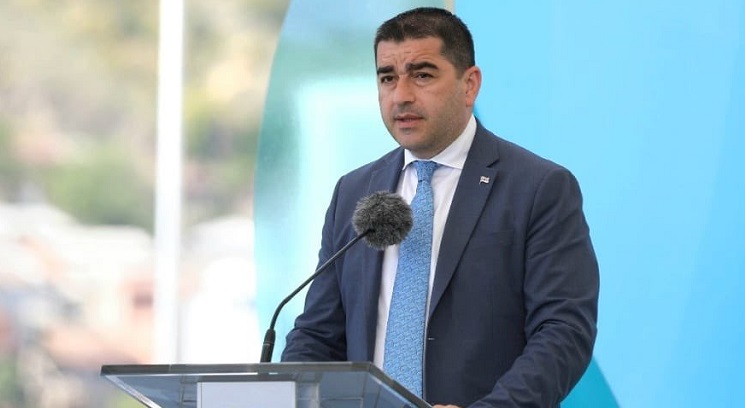Georgian parliament speaker to PACE chair: “baseless” record on ex-pres. Saakashvili in resolution damages Assembly image

In his letter to Tiny Kox, the president of the Parliamentary Assembly of the Council of Europe, Georgian parliament speaker Shalva Papuashvili said there was “no evidence of political motivation in the accusations around Saakashvili, except for speculations dictated by political motives”. Photo: Shalva Papuashvili’s twitter page
Georgian parliament speaker Shalva Papuashvili on Monday told Tiny Kox, the president of the Parliamentary Assembly of the Council of Europe, that the passage in body’s recently adopted resolution citing the imprisoned former president of Georgia Mikheil Saakashvili as a “political prisoner” opposing Russian president Vladimir Putin was “baseless” and “damaged the credibility” of the Assembly in the Georgian public.
While praising the “long-standing partnership” between PACE and Georgia, the Georgian official stressed the inclusion of the passage in the resolution on Russia-Ukraine war had prevented the Georgian delegates from voting for the document “despite our full solidarity with Ukraine”. He added the amendment also “hindered” the efforts of the Georgian authorities to “further strengthen support for an ambitious reform agenda consistent with the recommendations of PACE”.
We hope that PACE members will be guided only by the best interests and fundamental values of the organisation in the future”, said Papuashvili.
Pointing to violations under Saakashvili’s tenure, the parliament speaker noted the European Court of Human Rights had issued “more than one hundred judgments” on the rule of his government, including some involving “major human rights violations” such as right to life, prohibition of torture, right to a fair trial, right to libery and security, prevention of effective investigation and the imposition of a proper punishment.
In further comments, Papuashvili said a report on the state of human rights in Georgia between 2004-2012, drafted in 2013 by Thomas Hammarberg, the former CoE Commissioner for human rights and the EU special adviser on constitutional and legal reform and human rights in Georgia, was an evidence of “systematic violations of human rights” under Saakashvili’s presidency and had identified an “alarming situation” in the fields of judiciary and the law enforcement, minority rights, rights to assembly and expression, social justice and more.
 Ruling party MP Archil Talakvadze has stated that the amendment over Saakashvili was supported by only 56 out of 600 MPs, and noted that "I am sure that many, including Ukrainian MPs, were dissatisfied with the initiation of this change.” Photo: CoE.
Ruling party MP Archil Talakvadze has stated that the amendment over Saakashvili was supported by only 56 out of 600 MPs, and noted that "I am sure that many, including Ukrainian MPs, were dissatisfied with the initiation of this change.” Photo: CoE.
He also said Saakshvili had been found guilty in two separate cases of abuse of authority in Georgia, while three other cases of illegal rally dispersal, illegal seizure of property and embezzlement of state funds were pending in domestic courts.
The ECHR has refused to accept the case over the treatment of Saakashvili in the penitentiary system of Georgia [after his arrest in Tbilisi last October and allegations of ill-treatment by the former president]”, Papuashvili pointed out.
“The court said there were ‘no special circumstances’ related to human rights in the mentioned case [...] which has confirmed once again that Saakashvili's rights and interests are fully protected in Georgia”, the official said.
Papuashvili also noted Georgia had enjoyed a “good history of protecting human rights, democracy and the rule of law” since the ruling Georgian Dream party’s taking of office, with the government “closely cooperating” with the ECHR in the execution of its judgments.
Compared to the years of Saakashvili's rule between 2004-2012, between 2013-2021 the number of cases submitted to the European Court from Georgia has decreased by 5.5 times, which is a result of an increased credibility of Georgian courts, their independence and professionalism”, he said, adding “we believe that there is no evidence of political motivation in the accusations around Saakashvili, except for speculations dictated by political motives”.
“Accordingly, the note used in the fourth addendum to the resolution represents an unfounded criticism of the Georgian legal system, causes unjustified suspicion against the country in the international arena, and undermines the progress achieved by Georgia since 2012 in human rights”, Papuashvili said.
PACE adopted the resolution entitled “Further escalation in the Russian Federation’s aggression against Ukraine” on October 13, with the sentence on Saakashvili introduced as the fourth amendment by 45 MPs. In the voting on the addition, 56 MPs out of 600 cast their votes in favour, 27 against and 10 abstained.
 Tweet
Tweet  Share
Share